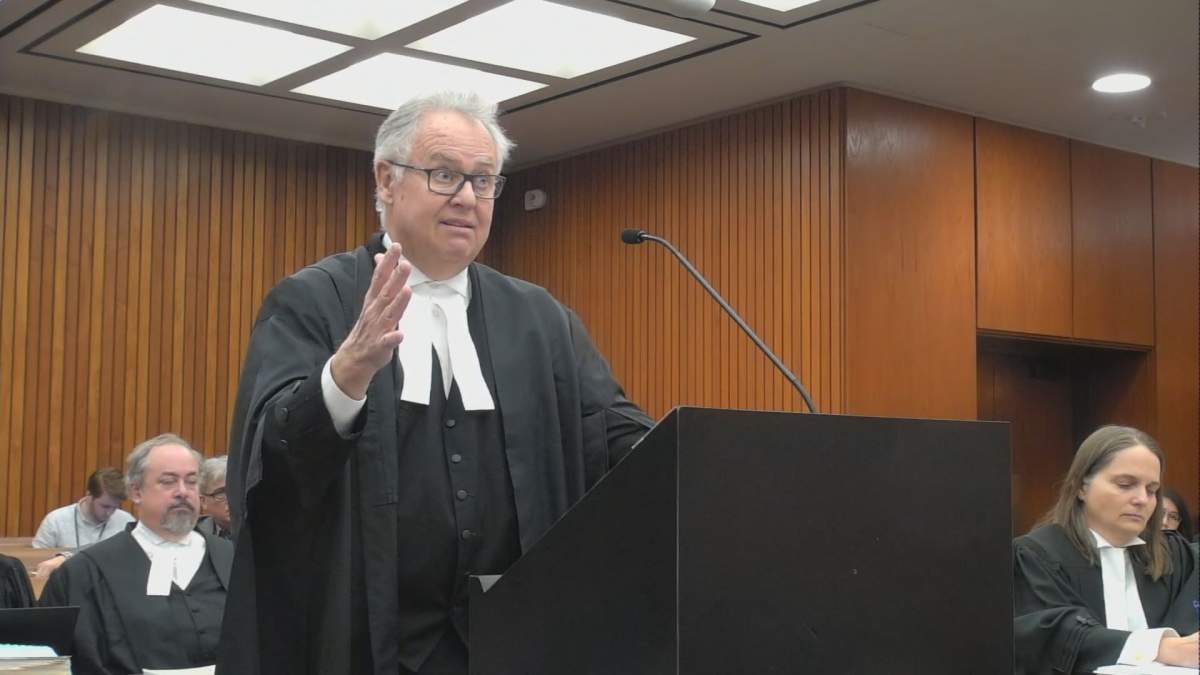For the first time, cameras have been allowed into the Alberta Court of Appeal to livestream a hearing about the federal carbon tax.

Beginning Dec. 16, a panel of five judges is hearing arguments about the constitutionality of the tax, which comes into effect Jan. 1. The province says the tax interferes with its exclusive jurisdiction.
The court issued a decision earlier this month to allow the three-day hearing to be livestreamed online by news organizations, including Global News.
Cases where cameras were allowed in Canadian courtrooms
This is the second time cameras have been allowed inside a courtroom in the province.
In September 2016, a Court of Queen’s Bench judge allowed cameras inside an Edmonton courtroom for the verdict in Travis Vader’s first-degree-murder trial in the 2010 deaths of St. Albert seniors Lyle and Marie McCann.

Get daily National news
The public watched as Justice Denny Thomas convicted Vader of second-degree murder in the high-profile deaths. But his ruling came under criticism almost immediately for using a section of the Criminal Code declared unconstitutional by the Supreme Court decades ago.
READ MORE: Alberta launches promised constitutional challenge of federal carbon tax
- Highway 1 east of Golden, B.C. closed due to crash, snowy weather
- Alberta government creating new all season resorts at Castle, Nakiska, Fortress
- Danielle Smith becomes first Alberta premier in 90 years to face citizen recall
- 12-year-old Alberta boy pleads guilty to attempted murder of little brother
Supreme Court of Canada: Cameras were allowed in the country’s top court in 1981 to hear arguments over the patriation of the Constitution. The high court has broadcast most proceedings since 1995.
Alberta: Cameras were allowed in for an inquiry into a matter involving the Alberta Securities Commission in 1980 and a fatality inquiry into the death of Connie Jacobs in 1999. Jacobs and her son were shot and killed by police on a reserve west of Calgary.
British Columbia: In 2000, closing arguments and jury instructions were broadcast in a migrant smuggling case. Closing arguments were also broadcast in 2011 when the province asked the court for its opinion on the constitutionality of Canada’s polygamy laws.
Manitoba: The province has had a cameras-in-the-courtroom initiative since 2014. No proceeding which involves testimony is part of the project, but in April 2014 the cameras rolled as Cassandra Knott was acquitted of the second-degree murder of her husband. Cameras have also been allowed for an appeal hearing, a docket hearing and for arguments over the legality of a provincial sales tax increase.
A camera was also allowed into the courtroom in Winnipeg in November 2018, when Guido Amsel was sentenced to life behind bars after sending a letterbomb to a local law office earlier that year.
Ontario: Court of Appeal review hearings for Steven Truscott and William Mullins-Johnson were broadcast in 2007. Both men had murder convictions overturned.








Comments